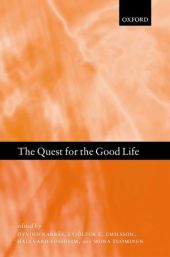 Neuerscheinungen 2015Stand: 2020-02-01 |
Schnellsuche
ISBN/Stichwort/Autor
|
Herderstraße 10
10625 Berlin
Tel.: 030 315 714 16
Fax 030 315 714 14
info@buchspektrum.de |

Eyjólfur K. Emilsson, Hallvard Fossheim, ťyvind Rabb†s, Miira Tuominen
(Beteiligte)
The Quest for the Good Life
Ancient Philosophers on Happiness
Herausgegeben von Rabb†s, ťyvind; Emilsson, Eyjólfur K.; Fossheim, Hallvard; Tuominen, Miira
2015. 318 S. 242 mm
Verlag/Jahr: OXFORD UNIVERSITY PRESS; OUP OXFORD 2015
ISBN: 0-19-874698-9 (0198746989)
Neue ISBN: 978-0-19-874698-0 (9780198746980)
Preis und Lieferzeit: Bitte klicken
Happiness was a central focus of ancient philosophy: this volume traces conceptions of happiness through nearly a millennium, from the Presocratics through Plato, Aristotle, and Hellenistic philosophy to the Neo-Platonists and Augustine in late antiquity. The contributors address questions raised by ancient thinkers that are still of deep concern.
How should I live? How can I be happy? What is happiness, really? These are perennial questions, which in recent times have become the object of diverse kinds of academic research. Ancient philosophers placed happiness at the centre of their thought, and we can trace the topic through nearly a millennium. While the centrality of the notion of happiness in ancient ethics is well known, this book is unique in that it focuses directly on this notion, as it appears inthe ancient texts. Fourteen papers by an international team of scholars map the various approaches and conceptions found from the Pre-Socratics through Plato, Aristotle, Hellenistic Philosophy, to the Neo-Platonists and Augustine in late antiquity. While not promising a formula that can guarantee a
greater share in happiness to the reader, the book addresses questions raised by ancient thinkers that are still of deep concern to many people today: Do I have to be a morally good person in order to be happy? Are there purely external criteria for happiness such as success according to received social norms or is happiness merely a matter of an internal state of the person? How is happiness related to the stages of life and generally to time? In this book the reader will find an informed
discussion of these and many other questions relating to happiness.
There is an abundance of volumes on ancient ethics, but this one stands out in two ways. Firstly, it is not mainly about Aristotle, who is the canonical figure in ancient ethics, but also includes papers on Plato, Hellenistic schools, the Greek commentators, and Augustine. The inclusion of philosophers of late antiquity deserves special mention ... Secondly, this volume takes ´the notion of happiness as its primary focus´ (5), where the intended contrast is presumably with volumes that focus primarily on virtue or excellence ... The greatest strength of this volume is that by shifting the focus from virtue to happiness it brings to light new issues, topics, and approaches, and shows that ancient ethics is richer, more complex and less homogeneous than is often assumed. Riin Sirkel, Notre Dame Philosophical Reviews Online


